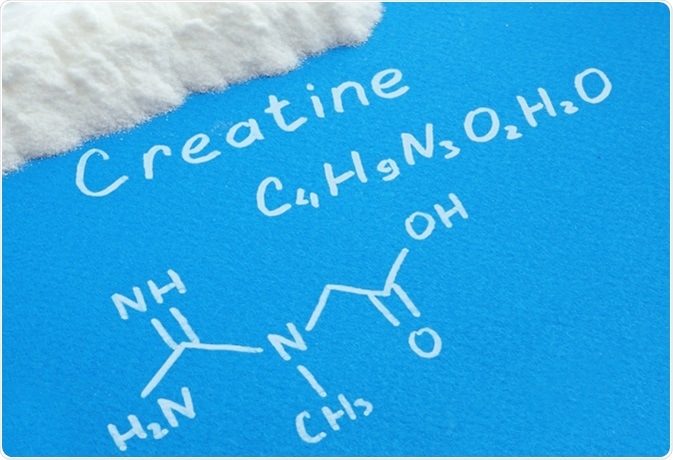Creatine is an endogenous amino acid which is synthesized in the liver, kidneys and pancreas. Approximately 95 percent of creatine is stored in the skeletal muscle where it takes part in regeneration of adenosine triphosphate (ATP) produced through the oxidative phosphorylation cycle.
Half the creatine in the body is obtained from dietary creatine, mainly from meat and fish. Nevertheless, this amino acid is used as a supplement in a wide range of disease and exercise settings to increase creatine utilization and availability. Supplements are commonly used orally in the form of creatine monohydrate.

Image Credit: designer491 / Shutterstock
Main Effects of Creatine
Creatine supplementation helps to improve muscle size and power of contraction, but can also increase the body mass (mostly lean mass) when combined with regular intensive resistance training. The effect is thought to be due to rapid regeneration of ATP during high-intensity exercise, so that workout quality improves during training.
Creatine helps athletes carry out short high-intensity exercises and repetitive sports, which depend heavily on anaerobic metabolism. This molecule may increase the amount of ionic calcium that flows into the sarcoplasmic reticulum inside the muscle cell, which could help faster contractions to take place.
Furthermore, creatine supplementation can significantly increase the lean mass and contractile protein content of the body when compared with protein alone. The effect of creatine in this situation is probably by inducing transcriptional changes in genes concerned with muscle protein synthesis.
Creatine supplements may also help prolong the duration of steady aerobic exercise by changing the substrate for the enzymes involved in oxidative phosphorylation which supplies energy for the contracting skeletal muscle fiber. This may be due to a lower level of lactate accumulation, pointing to differences in the anaerobic threshold.
Creatine is thought to increase the amount of glycogen in the muscle during exercise. Both an initial higher level and an increased sustained level of glycogen stores in skeletal muscle during high-intensity or endurance exercise have been observed, especially when creatine and carbohydrates are supplemented.
Creatine and Muscle Healing
Creatine supplementation causes faster recovery, less loss of muscle strength, and lower levels of injury markers following very strenuous or even supramaximal muscle exercise or muscle injury sufficient to cause immobilization.
When creatine is supplemented following the exercise, muscle regeneration is favoured, with more muscle building, better recovery, and less severe damage. This could be due to a higher calcium buffering capacity with lower activation of proteases, which result in less calcium flooding into the muscle.
The antioxidant mechanism of creatine action may also be a factor in this beneficial action by reducing DNA and lipid peroxidation during very hard endurance exercise. Arginine in creatine may be responsible for its direct antioxidant properties as well as being a substrate for and thereby increasing the concentration of nitric oxide, a known modulator of skeletal muscle metabolism and contractility.
Creatine supplementation increases muscle stiffness and stretch resistance, reducing the range of motion at the ankle and shoulder, at least in the initial loading phase of supplementation.
Other Effects of Creatine and its Use in Children
Creatine has numerous other effects as well, such as better cognitive parameters (including those affected by less sleep and aging processes), better muscle strength, bone mineral density, muscle size, and ease of activities of daily living. It also shows a positive impact on neurodegenerative diseases, certain myopathies and creatine deficiency syndromes.
Creatine supplementation is discouraged in children, including adolescents, firstly because of the paucity of safety data in this group, and secondly because of the risk that they may go on to supplements with more dangerous substances such as anabolic steroids. At present, therefore, their use in this age group is still controversial.
Creatine Protocols
Creatine supplementation may begin with a loading dose of 20 g/day creatine monohydrate or 0.3g/kg/day, with maintenance doses of 3-5 g/day or 0.03 g/kg/day. A more evenly spread out dosing protocol helps to retain more of the administered dose in the form of increased body mass.
It is important to realize that individuals may or may not respond to creatine supplementation due to many characteristics, such as a high resting muscle creatine level, increased type 2 fiber percentage in skeletal muscle, and a high initial size for other types of fibers.
Creatine supplements available at present include creatine monohydrate, which is the most commonly used form, while novel forms include anhydrous creatine, creatine salts, creatine esters and creatine effervescent. Research is still underway to establish the differences in efficacy and safety profiles of various formulations.
In the same way, the ideal combination of compounds (such as carbohydrates, protein and taurine) in a creatine supplement is still being worked out. The safety profile of creatine is generally favourable, but care needs to be taken in the elderly or adolescent population, or when renal parameters are affected.
References
Further Reading
Last Updated: Feb 26, 2019